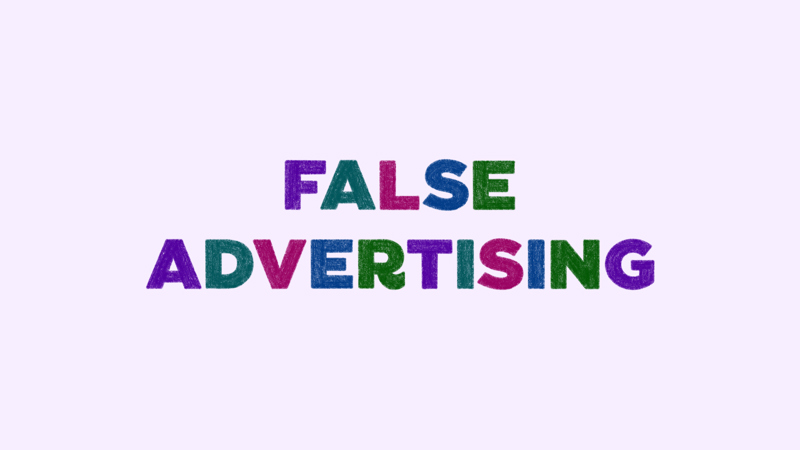
False advertising
You’ll need
- Device to show photos, videos, or slides
Watch some ads
- The person leading the activity should show everyone some examples of adverts that challenge or reinforce gender stereotypes.
- Everyone should chat about the adverts. What were their messages? Which stereotypes where challenged? Which were reinforced?
- Everyone should talk about why adverts matter. They might think about how they reflect a culture but also reinforce beliefs by presenting them as acceptable, even if they’re trying to be funny.
Find some ads
- Everyone should get into small groups.
- Each group should try to find other examples of adverts that challenge or maintain stereotypes. They should try to find some from other countries too.
- Everyone should think about how the adverts make them feel. How do they feel when they see a stereotype being challenged? What about when they’re maintained?
- Everyone should think about what they’d change if there were in charge of re-shooting the advert.
- Each group should take it in turns to show their advert to everyone else. They should explain what’s good or bad about it, and what they’d change if they were in charge.
People could think about companies’ motivations. Why might they create adverts that challenge gender stereotypes?
Do people think these adverts need to be backed up with real commitments? For example, do the companies (or the bigger companies that own the brands) have an equal mix of genders in the lead? What other products does the big company sell – are they all as ethical? How does the company work in other countries – does it pay women a true living wage, for example?
- Always – this advert tries to address stereotypes about women in sports, especially the messages girls get when they reach puberty (and start using products like the ones Always sells). Is this advert effective? What do people think about the hashtag #LikeAGirl?
- Aptamil – this advert’s been criticised for promoting gender stereotypes. It shows babies and the jobs they might grow up to do – the women dances while the men rock climb and do maths. Some people have argued that the gender of the babies isn’t clear. If this is true, is it OK that the adults are shown as they are?
- Gillette – this advert challenges toxic masculinity. Does it represent how it negatively affects men too? Some people have suggested the advert’s offensive because it portrays men negatively – are there portrayals of strong men doing the right thing?
- Guinness – this advert’s been praised for challenging stereotypes by promoting women’s rugby. It’s challenging the stereotype that women don’t play contact sports, and also challenging the stereotype that women don’t drink beer. Why might Guinness want to challenge the stereotype that women don’t drink beer?
- RAF – this advert takes sound clips from other adverts that are targeted at women and plays them over videos of women taking part in military work. It’s fighting the stereotype that women don’t serve in the armed forces. How does it make people feel about the other adverts the audio’s taken from?
- This Girl Can – this advert challenges stereotypes of women in sport. Does it show anything surprising? Who does it represent? People might think about how it represents women of different sizes, abilities, and skin colours. Did anyone notice how the advert showed periods?
- Yorkie – how does this advert make people feel? The chocolate bar dropped their ‘not for girls’ campaign in 2012. Why do people think they made that choice? They started using the slogan ‘man fuel for man stuff’. How do people feel about this?
- This Indian advert for fans has the slogan ‘Hawa Badlegi’, which is Hindi for ‘the wind will change’. It shows a couple at a registrar’s office – the husband takes the wife’s last name, which makes the official do a double take as it’s so unexpected!
- This Indian advert for a clothes brand has the slogan ‘bold is beautiful’ and shows how pregnant people face discrimination at work.
- This Indian advert for a smartphone network shows a woman in a position of power in an office, yet she’s still the one who goes home and cooks the dinner.
- This American advert for Olay talks about women in space and encourages people to raise money for Girls Who Code. But what message comes with Olay’s products?
- This Chinese advert for Audi compared women to used cars!
Reflection
This activity was about caring. What impact can adverts have when they challenge or reinforce gender stereotypes? Do adverts have the power to affect the real world? For example, how would men feel if every advert, TV show, and film portrayed them as rubbish at looking after pets? Do people think fewer men might end up buying pets? What would people start to believe about men’s ability to look after pets? What real world issues did the adverts feature? How might they help other people? For example, an advert that encourages women to take part in sport might help women feel empowered to give it a go.
This activity was also about being a citizen. What can people do if they see something that isn’t right, such as gender stereotyping? People could think about how they could complain and highlight when things are wrong (for example, Ofcom has information on complaining about ads on TV or radio). What else could people do? People might think about the importance of leading by example and choosing to be supportive and inclusive with what they do. Were people surprised by the issues that appeared in the adverts from other countries? Is gender equality a global issue?
Safety
All activities must be safely managed. You must complete a thorough risk assessment and take appropriate steps to reduce risk. Use the safety checklist to help you plan and risk assess your activity. Always get approval for the activity, and have suitable supervision and an InTouch process.
- Online safety
Supervise young people when they’re online and give them advice about staying safe. Take a look at our online safety or bullying guidance. The NSPCC offers more advice and guidance, too. If you want to know more about specific social networks and games, Childnet has information and safety tips for apps. You can also report anything that’s worried you online to the Child Exploitation and Online Protection Command. As always, if you’ve got concerns about a young person’s welfare, including their online experiences, follow the Yellow Card to make a report.
Think about how adverts represent other people too. Did any of the adverts represent disabled people? What about people who are BAME?
People should share in whatever way works for them, whether that’s writing, drawing, speaking, or something else. Not everyone has to present back to other groups.
All Scout activities should be inclusive and accessible.
If people want to do more about gender equality, take a look at how Scouts are supporting the UN Women’s HeForShe initiative.
If people feel strongly about a particular advert, they could write to the company and tell them what they think. This probably only works for recent adverts, though.
